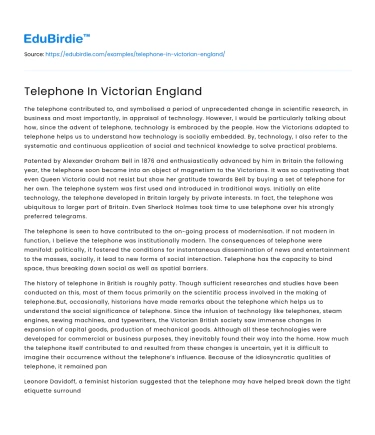The telephone contributed to, and symbolised a period of unprecedented change in scientific research, in business and most importantly, in appraisal of technology. However, I would be particularly talking about how, since the advent of telephone, technology is embraced by the people. How the Victorians adapted to telephone helps us to understand how technology is socially embedded. By, technology, I also refer to the systematic and continuous application of social and technical knowledge to solve practical problems.
Patented by Alexander Graham Bell in 1876 and enthusiastically advanced by him in Britain the following year, the telephone soon became into an object of magnetism to the Victorians. It was so captivating that even Queen Victoria could not resist but show her gratitude towards Bell by buying a set of telephone for her own. The telephone system was first used and introduced in traditional ways. Initially an elite technology, the telephone developed in Britain largely by private interests. In fact, the telephone was ubiquitous to larger part of Britain. Even Sherlock Holmes took time to use telephone over his strongly preferred telegrams.
Save your time!
We can take care of your essay
- Proper editing and formatting
- Free revision, title page, and bibliography
- Flexible prices and money-back guarantee
The telephone is seen to have contributed to the on-going process of modernisation. If not modern in function, I believe the telephone was institutionally modern. The consequences of telephone were manifold: politically, it fostered the conditions for instantaneous dissemination of news and entertainment to the masses, socially, it lead to new forms of social interaction. Telephone has the capacity to bind space, thus breaking down social as well as spatial barriers.
The history of telephone in British is roughly patty. Though sufficient researches and studies have been conducted on this, most of them focus primarily on the scientific process involved in the making of telephone.But, occasionally, historians have made remarks about the telephone which helps us to understand the social significance of telephone. Since the infusion of technology like telephones, steam engines, sewing machines, and typewriters, the Victorian British society saw immense changes in expansion of capital goods, production of mechanical goods. Although all these technologies were developed for commercial or business purposes, they inevitably found their way into the home. How much the telephone itself contributed to and resulted from these changes is uncertain, yet it is difficult to imagine their occurrence without the telephone’s influence. Because of the idiosyncratic qualities of telephone, it remained pan
Leonore Davidoff, a feminist historian suggested that the telephone may have helped break down the tight etiquette surrounding aristocratic social circles.






 Stuck on your essay?
Stuck on your essay?

